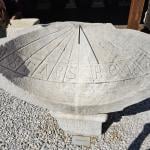Here’s my best effort to summarize Robert Jenson’s take on God-and-time, written with faux-Jensonesque pithiness. Is God eternally and infinitely the eternal and infinite God that He is? Of course. He’s God. Is God dependent on creation for His fulfillment? Of course not. He’s God. The biblical God uniquely does not try to escape time. All other gods do; that’s what makes them gods. The world is what it is. History is what it is. No use worrying what might... Read more














